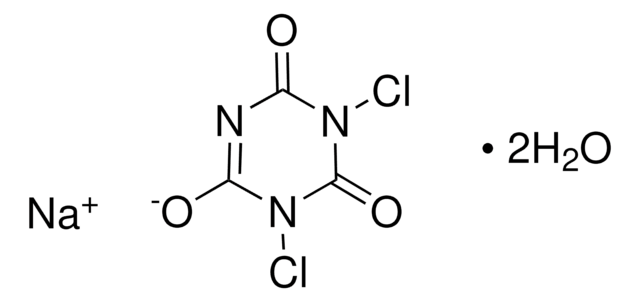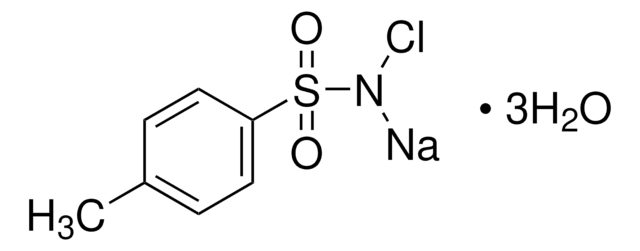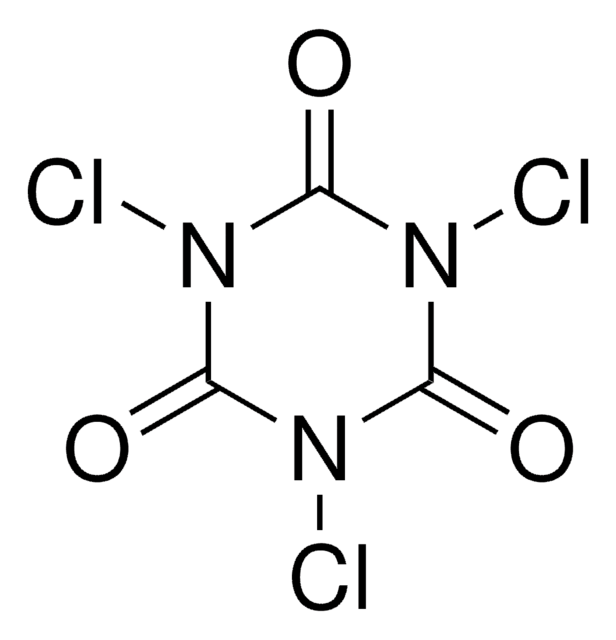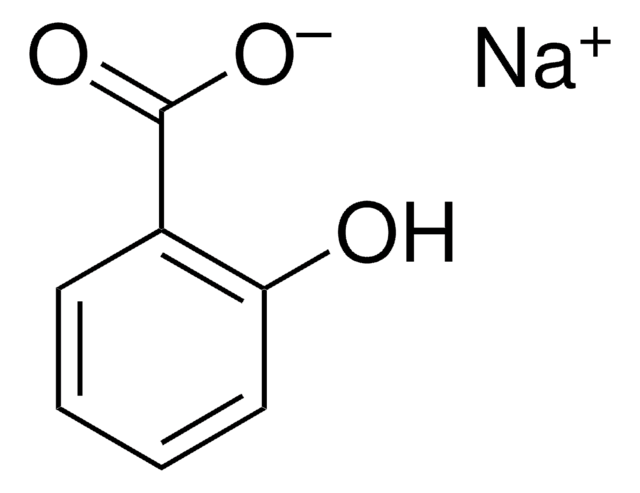218928
Sodium dichloroisocyanurate
96%
Sinónimos:
NaDCC, 3,5-Dichloro-2-hydroxy-4,6-s-triazinedione sodium salt, Dichloro-s-triazinetrione sodium salt
About This Item
Productos recomendados
assay
96%
form
(Granules or Granular Powder)
reaction suitability
reagent type: oxidant
SMILES string
[Na]N1C(=O)N(Cl)C(=O)N(Cl)C1=O
InChI
1S/C3HCl2N3O3.Na/c4-7-1(9)6-2(10)8(5)3(7)11;/h(H,6,9,10);/q;+1/p-1
InChI key
MSFGZHUJTJBYFA-UHFFFAOYSA-M
¿Está buscando productos similares? Visita Guía de comparación de productos
General description
Application
- N-monochlorination and dehydrochlorination of amino esters
- Chlorination to detect ammonium via formation of colored zebra-bands in a deteting tube
- Synthesis of antimicrobial polyurethane additives to control biofilm
- Preparation of bromochloroisocyanurate for electrophilic cobromination of alkenes and bromination of arenes
- An oxidizing reagent for the preparation of tetrazene(N–N=N–N)-linked bi(1,2,4-triazole) from 4-amino-1,2,4-triazole by oxidizing N-NH2 functional group.
- A chlorinating agent for the N-monochlorination of α-amino esters and α-amino-β-diesters.
It can also be used to prepare NaDCC immobilized magnetic nano-Fe3O4 material, which is used as an excellent disinfectant as well as a wastewater treatment agent.
Disclaimer
signalword
Danger
hcodes
Hazard Classifications
Acute Tox. 4 Oral - Aquatic Acute 1 - Aquatic Chronic 1 - Eye Dam. 1 - Ox. Sol. 2 - Skin Corr. 1A - STOT SE 3
target_organs
Respiratory system
supp_hazards
Storage Class
4.1A - Other explosive hazardous materials
wgk_germany
WGK 2
flash_point_f
Not applicable
flash_point_c
Not applicable
ppe
Eyeshields, Gloves, type P3 (EN 143) respirator cartridges
Certificados de análisis (COA)
Busque Certificados de análisis (COA) introduciendo el número de lote del producto. Los números de lote se encuentran en la etiqueta del producto después de las palabras «Lot» o «Batch»
¿Ya tiene este producto?
Encuentre la documentación para los productos que ha comprado recientemente en la Biblioteca de documentos.
Los clientes también vieron
Nuestro equipo de científicos tiene experiencia en todas las áreas de investigación: Ciencias de la vida, Ciencia de los materiales, Síntesis química, Cromatografía, Analítica y muchas otras.
Póngase en contacto con el Servicio técnico













